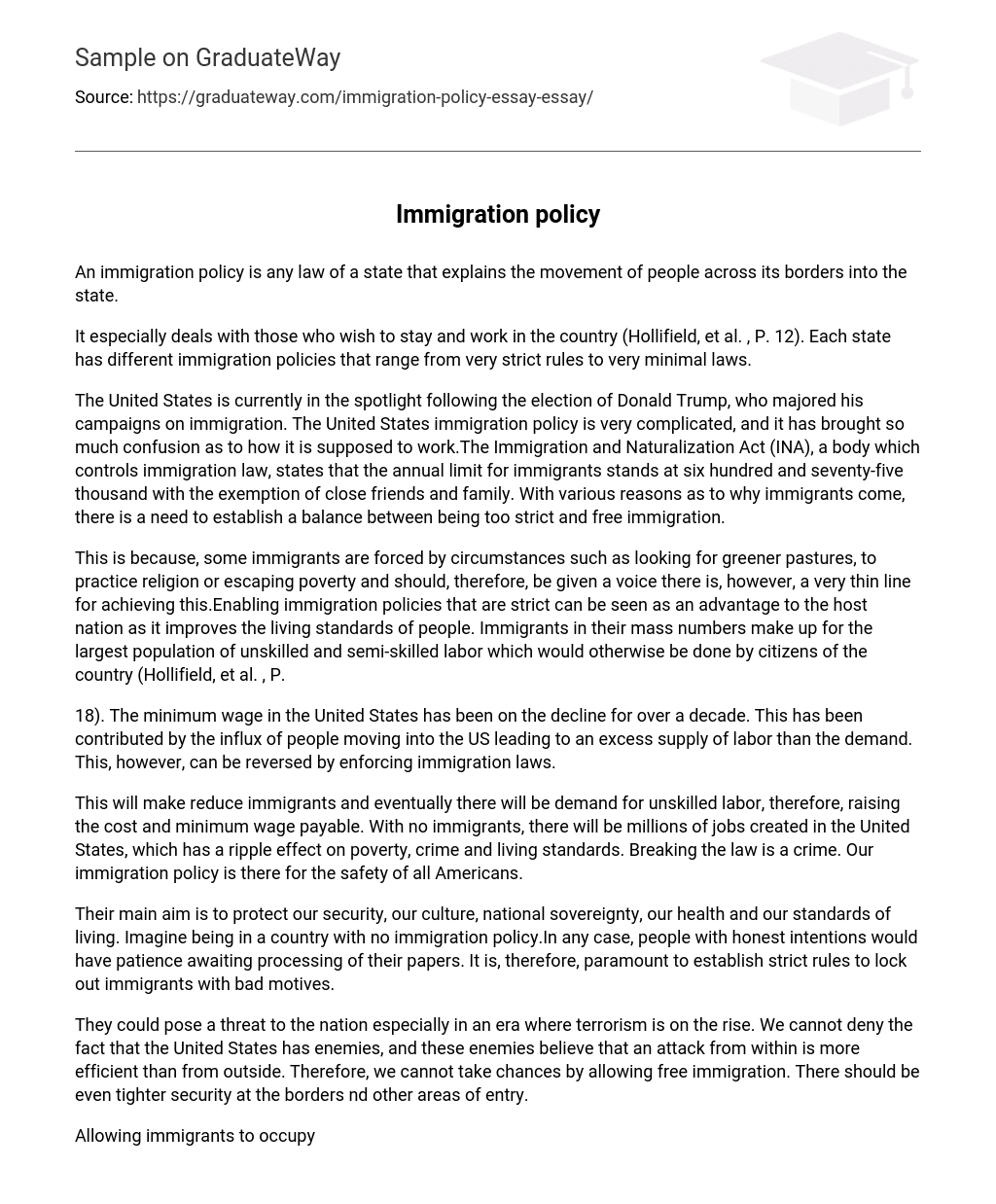An immigration policy is any law of a state that explains the movement of people across its borders into the state.
It especially deals with those who wish to stay and work in the country (Hollifield, et al. , P. 12). Each state has different immigration policies that range from very strict rules to very minimal laws.
The United States is currently in the spotlight following the election of Donald Trump, who majored his campaigns on immigration. The United States immigration policy is very complicated, and it has brought so much confusion as to how it is supposed to work.The Immigration and Naturalization Act (INA), a body which controls immigration law, states that the annual limit for immigrants stands at six hundred and seventy-five thousand with the exemption of close friends and family. With various reasons as to why immigrants come, there is a need to establish a balance between being too strict and free immigration.
This is because, some immigrants are forced by circumstances such as looking for greener pastures, to practice religion or escaping poverty and should, therefore, be given a voice there is, however, a very thin line for achieving this.Enabling immigration policies that are strict can be seen as an advantage to the host nation as it improves the living standards of people. Immigrants in their mass numbers make up for the largest population of unskilled and semi-skilled labor which would otherwise be done by citizens of the country (Hollifield, et al. , P.
18). The minimum wage in the United States has been on the decline for over a decade. This has been contributed by the influx of people moving into the US leading to an excess supply of labor than the demand. This, however, can be reversed by enforcing immigration laws.
This will make reduce immigrants and eventually there will be demand for unskilled labor, therefore, raising the cost and minimum wage payable. With no immigrants, there will be millions of jobs created in the United States, which has a ripple effect on poverty, crime and living standards. Breaking the law is a crime. Our immigration policy is there for the safety of all Americans.
Their main aim is to protect our security, our culture, national sovereignty, our health and our standards of living. Imagine being in a country with no immigration policy.In any case, people with honest intentions would have patience awaiting processing of their papers. It is, therefore, paramount to establish strict rules to lock out immigrants with bad motives.
They could pose a threat to the nation especially in an era where terrorism is on the rise. We cannot deny the fact that the United States has enemies, and these enemies believe that an attack from within is more efficient than from outside. Therefore, we cannot take chances by allowing free immigration. There should be even tighter security at the borders nd other areas of entry.
Allowing immigrants to occupy our land is a volcano waiting to erupt. Long before the events of September 11, our immigration policy had the primary purpose of protecting us. It is not new that the government issues visa and passports so as to monitor and control who enters the country and why. However much we tend to see immigrants as pain to our system, we cannot turn a blind eye to their contribution to the economy.
Kicking them out would throw the country into disaster. To start with undocumented immigrants can amass debt in the country.Being deported will make it less likely for them to pay them and this debt will have to be recovered by the government. The risk that this imposes on the financial systems is too high a risk to be ignored.
For example, to obtain a mortgage, credit card or a car loan one does not need to be a resident or a citizen of the United States. All one needs is a history of tax payment and they are guaranteed a loan. As it is not clear how many mortgages and loans have been given to undocumented immigrants, there would be a significant risk of deporting them.What this means is these immigrants are buyers, sellers, and taxpayers and contribute significantly to the national budget.
So we need to ask ourselves whether it is worth destroying the economy by mass deportations yet they are responsible borrowers (Mark, theconversation. com). Besides this, deportation of immigrants will affect the job market and economic growth. The economic contribution of these immigrants has been well discussed in a report by the National Academy of Sciences, Engineering, and Medicine.
The report establishes that eporting all the immigrants would result in a six percent labor force and cut the Gross Domestic Product of the country by one $1. 6 trillion. Immigrant labor is not directly substituted with other workers and therefore can seem of lesser value. Undocumented immigrants, mainly work in unfavorable conditions as they have no better options.
They work in jobs that the majority of Americans would find less desirable and might work at a lower cost. Thus, companies might need to raise the wages and remuneration, resulting in reduced capacity to hire and an impact on growth (Mark, theconversation. om).Put together; these factors mean that the government must think carefully before aggressively pursuing immigrants.
There are significant costs associated with the deportations, and the government should consider them carefully when weighing its policy objectives. These immigrants are a critical part of our economy. It is not debatable that we as a nation cannot live without them. Therefore, the government should work on reducing the bureaucratic procedure that is required to obtain citizenship.
Immigrants should be given a chance as they have more value addition, inclusive of their culture and diversity.





